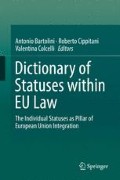Abstract
The status of EU official is one of the most relevant legal statuses in the legal framework, and it sets the grounds and the rules of the game for EU officials. The European civil service is composed of European officials, who are subject to a set of regulations, and of temporary and contract staff governed by public law. The current EU Staff Regulations, the main foundation of the European civil service, have undergone constant evolution over the years due to the dynamic and ongoing growth of the service up to the present time. The principal objective of the Staff Regulations is to regulate the relationship between the institutions and the EU officials, establishing mutual obligations and rights. Officials and agents are, consequently, holders of the rights and bearers of the duties set out in the Staff Regulations and in primary law. Any violation of the law could lead to the adoption of disciplinary measures and the possible termination of the employment relationship. The European institutions expect their staff to abide by high professional and ethical standards.
Access this chapter
Tax calculation will be finalised at checkout
Purchases are for personal use only
Notes
- 1.
See Joined Cases 27/59 and 39/59, Alberto Campolongo v High Authority of the ECSC, ECR [1960], 391.
- 2.
See Cases-25/60De Bruyn/Common Assembly, ECR [1962] 21.
- 3.
Protocol (No 7) on the Privileges and Immunities of the European Union, Art. 2.
- 4.
See Joined Cases 27/59 and 39/59, Alberto Campolongo v High Authority of the ECSC, ECR [1960], 391.
- 5.
Article 56b of the Staff Regulations.
- 6.
See CJEU C-102-75 Petersen v Commission, ECLI:EU:C:1976:172: the appointment of an official should be based on a unilateral decision of the appointing authority. Thus, the established link between an official and his institution is statutory and not contractual in nature: CJEU, 27 October 2004, (T-508/93, RecFP P. II-761).
- 7.
Before the 2004 reform, there were four broad categories of officials (and not ‘function groups’), which were identified in descending order in Article 5.1 by the letters A (superior career), B (intermediate career), C (average career) and D (normal career), as well as language grades designated by letters L/A for translation and interpretation tasks; all these categories were further divided into different grades (Art. 5-1). On this issue, readers should consult the work of Rogalla (1982, pp. 48–49). See also Molina Del Pozo (1988). However, these categories have not, in general, disappeared. They were actually recast in a more flexible and appropriate qualification system. The Commission decided, with the support of the Council, to create two function groups, a group of administrators consisting of officials of Category A, such as linguists for example, and a group of assistants consisting of officials in the former categories B, C and D, thus allowing an improvement, taking into account merit and the right to a more linear career development.
- 8.
Likewise, see Regulation (EU, EURATOM) No 1023/2013 of the European Parliament and of the Council of 22 October 2013 amending the Staff Regulations of Officials of the European Union and the Conditions of Employment of Other Servants of the European Union (OJ L 287/19 of 29 October 2013).
- 9.
Article 5.2 §1 of amended Staff Regulations of 1 May 2004.
- 10.
Article 5.3 (b) and (c).
- 11.
Annex I Types of posts in each function group, as provided for in Article 5(3) of the Staff Regulations.
- 12.
The jobs described in grade AD5 also correspond to those in grade AST5, but the latter does not require the same education and training level.
- 13.
Article 5.2 § 2 of the Staff Regulations.
- 14.
OJ L 56, 4.3.1968, 1.
- 15.
Contractual agents, who may not exceed 75% of the relevant staff.
- 16.
See Rogalla (1982, pp. 104–113). Previously, there were also auxiliary staff on fixed-term contracts with the possibility of extensions until 31 December 2007. From 31 December 2006 it was possible to employ new auxiliary agents under Article 52 of the Staff Regulations, which was inserted by Regulation No 723/2004 of the Council of 22 March 2004, OJ L 123, 27.4.2004, page 1. However, there is now a category of auxiliary contract agents, laid down by Articles 3b and 3c of the Regulation, applicable to other servants who perform manual or administrative support service tasks.
- 17.
CJEU, T-273/94 N v Commission, Rec Fp P. II-289 §126-132.
- 18.
See CJEU, C-54/90, Weddel v Commission, Rec. [1992] I-871 §20.
References
Gervasoni, S. (2005, February). Un nouveau statut pour les fonctionnaires des Communautés européennes: les principales dispositions de la réforme. CFP, 8–13.
Molina Del Pozo, C. F. (1988). Europa y los funcionarios. Madrid: Fundación Universidad Empresa.
Rogalla, D. (1982). Fonction publique européenne. Brussels: Fernand Nathan and Editions Labour, Collection Europe.
Author information
Authors and Affiliations
Corresponding author
Editor information
Editors and Affiliations
Rights and permissions
Copyright information
© 2019 Springer Nature Switzerland AG
About this chapter
Cite this chapter
Molina del Pozo, C.F., Molina del Pozo Martín, P. (2019). EU Officer. In: Bartolini, A., Cippitani, R., Colcelli, V. (eds) Dictionary of Statuses within EU Law. Springer, Cham. https://doi.org/10.1007/978-3-030-00554-2_29
Download citation
DOI: https://doi.org/10.1007/978-3-030-00554-2_29
Published:
Publisher Name: Springer, Cham
Print ISBN: 978-3-030-00553-5
Online ISBN: 978-3-030-00554-2
eBook Packages: Law and CriminologyLaw and Criminology (R0)

